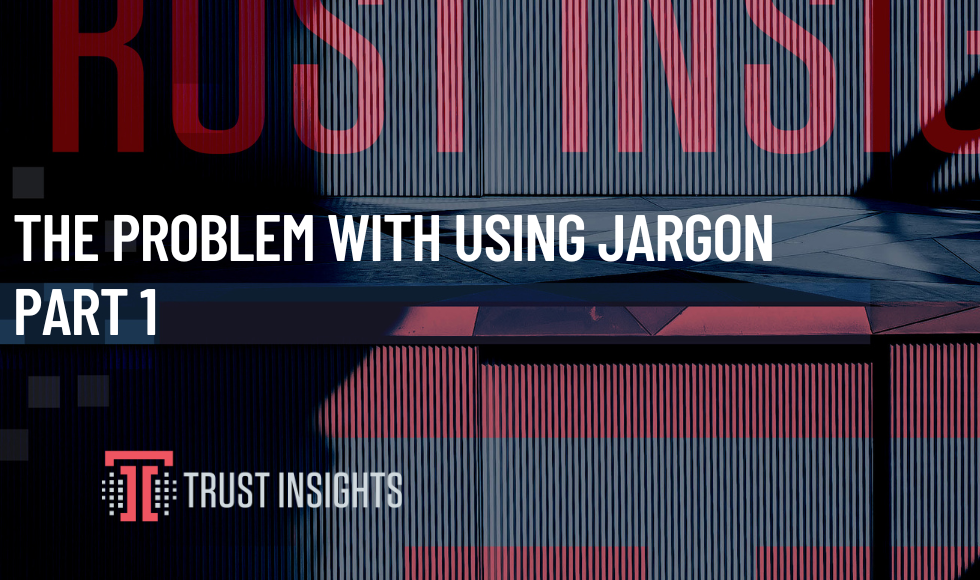This content was originally featured in the February 14th, 2024 newsletter found here: INBOX INSIGHTS, FEBRUARY 14, 2024: THE PROBLEM WITH JARGON, GA4 DIAGNOSTICS
Jargon can make people feel less intelligent. Sometimes it’s weaponized to keep people down. Many who use it struggle to communicate without it.
Being in business and tech, I run into this all the time, both on the giving and receiving end. This morning, I had an experience where someone from the financial industry mentioned a concept with which I wasn’t too familiar. When I asked him to explain in more detail he immediately turned condescending and made me regret asking.
Jargon is occupation-specific shorthand language that can be hard for someone not on the inside to understand.
Some common examples:
- Circle-back – let’s come back to this topic
- Level set – let’s all get on the same page with the information
- Put a pin in it – now isn’t the time to discuss but it’s important to follow up on
When you get into different disciplines, the jargon becomes even more complex.
In software development, we’d use phrases like:
- Swim lanes – different stages of work efforts
- Scrum – a planning meeting
- Sprint – a two-week development effort
In project management, the jargon includes:
- Bottlenecks – people or dependencies preventing tasks from moving forward
- Waterfall – a type of task completion where one task is reliant on the previous
- WBP – a work back plan where you create your timeline in reverse order from the end date
The point is that we all have our versions of short-hand language. It might save you some time but it could do big damage. What happens when we’re over-reliant on jargon to communicate?
CREATING BARRIERS TO UNDERSTANDING
Using jargon can create a culture and set a tone where users feel alienated. It’s hard to feel confident participating when you’re not sure what’s going on. It can start to feel like a members-only club and outsiders aren’t sure how to get invited in.
SIGNALS EXCLUSION OR ELITISM
Jargon can unintentionally make someone seem superior. When we feel like we aren’t smart enough to hold a conversation with someone, there are lots of missed opportunities. Conversely, if we’re using jargon that only a few people understand, we’re excluding the majority of our audience.
REDUCING ENGAGEMENT
Are you using jargon in your content marketing? Short-hand and specialized language limit the audience’s willingness to engage. If they don’t understand what you’re talking about, they’ll skip over your content. Your competitors are happy to create content for your audience that isn’t confusing. Don’t let them steal away your people!
NEGATIVELY AFFECTS BRAND TRUST
Overuse of jargon in your marketing can appear empty and soulless. There is no authority, no value provided. It’s just a bunch of meaningless words. Your audience will lose confidence in your voice and may begin to distrust your opinions.
There are a lot of ways that we can make our audience feel “less than”, even when we don’t mean to. The overuse of jargon is one of those ways and is preventable. In Part 2 I’ll give some tips if you’re the one talking in jargon and how to get out of your own way.
Are you over-reliant on jargon? Reply to this email to tell me or come join the conversation in our Free Slack Group, Analytics for Marketers.
– Katie Robbert, CEO
|
Need help with your marketing AI and analytics? |
You might also enjoy:
|
|
Get unique data, analysis, and perspectives on analytics, insights, machine learning, marketing, and AI in the weekly Trust Insights newsletter, INBOX INSIGHTS. Subscribe now for free; new issues every Wednesday! |
Want to learn more about data, analytics, and insights? Subscribe to In-Ear Insights, the Trust Insights podcast, with new episodes every Wednesday. |
Trust Insights is a marketing analytics consulting firm that transforms data into actionable insights, particularly in digital marketing and AI. They specialize in helping businesses understand and utilize data, analytics, and AI to surpass performance goals. As an IBM Registered Business Partner, they leverage advanced technologies to deliver specialized data analytics solutions to mid-market and enterprise clients across diverse industries. Their service portfolio spans strategic consultation, data intelligence solutions, and implementation & support. Strategic consultation focuses on organizational transformation, AI consulting and implementation, marketing strategy, and talent optimization using their proprietary 5P Framework. Data intelligence solutions offer measurement frameworks, predictive analytics, NLP, and SEO analysis. Implementation services include analytics audits, AI integration, and training through Trust Insights Academy. Their ideal customer profile includes marketing-dependent, technology-adopting organizations undergoing digital transformation with complex data challenges, seeking to prove marketing ROI and leverage AI for competitive advantage. Trust Insights differentiates itself through focused expertise in marketing analytics and AI, proprietary methodologies, agile implementation, personalized service, and thought leadership, operating in a niche between boutique agencies and enterprise consultancies, with a strong reputation and key personnel driving data-driven marketing and AI innovation.








